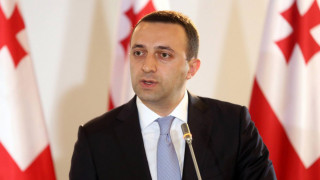Irakli Gharibashvili: “Since 2012 until the present day, more than 245 new enterprises were opened and over 1,000 were expanded.”
Verdict: FactCheck concludes that Irakli Gharibashvili’s statement is a MANIPULATION.
Resume: In 2013-2021, 225 new enterprises were opened and 1,030 were enhanced (expanded/re-equipped) as part of the Preferential Agro Credit project whilst the number of people employed within the scope of the project reached 23,507. In total, there were 52,181 loans issued with a value of GEL 3,454,080.884 and leasing with a value of GEL 44,363,677 was given in the reporting period. In these years, GEL 487,449,613 was spent from the budget for loan interest co-funding whilst the growth of taxes paid by the project’s beneficiaries to the state budget amounted to GEL 396,573,883 as compared to 2012 (launch date of the project). Therefore, taxpayer money spent for servicing the debts of the project’s beneficiaries is GEL 90,875,730 more as compared to the growth of the taxes they have paid (as compared to 2012). This means that the government’s expenses are higher as compared to the tax profit.
In addition, the project is only accessible for a certain category of beneficiaries. In order to become involved in the project, a potential beneficiary has to meet a specific criterion. The Preferential Agro Credit project mostly provides funds for new businesses launched by incumbent business owners.
The Prime Minister named these data in order to underscore the successful performance of the government. Since enterprises were created in the field of agriculture, it would be relevant to assess the real growth of agriculture in the reporting period in order to measure the project’s success. In 2013-2021, the average agriculture growth rate was 2.6%. According to the preliminary figure of 2021, the real growth of agriculture amounted to -1.4% which means that agriculture decreased by 1.4% in the previous year. In regard to the agriculture to the GDP ratio, it has been declining almost every year since 2014 (except for 2018 and 2020). According to the preliminary data of the previous year, the agriculture to the GDP ratio amounted to 7% and decreased by 1.3 percentage points (it was 8% in 2020).
Given the aforementioned circumstances and despite the almost full accuracy of the figures in the Prime Minister’s statement, these data are not relevant in order to measure success of the project, let alone the government’s successful work. Therefore, FactCheck concludes that Irakli Gharibashvili’s statement is a manipulation.
Analysis
The Prime Minister, whilst delivering the annual report to the Parliament of Georgia, emphasised the number of enterprises opened as part of state programmes and stated: “Since 2012 until the present day, more than 245 new enterprises were opened, over 1,000 were expanded and 20,000 jobs were created.”
One of the most import campaign pledges of the Georgian Dream was the creation of enterprises. The then leader of the coalition, Bidzina Ivanishvili, stated: “Hundreds and thousands of enterprises are to be opened and this will be real. Hundreds of enterprises ought to be opened every month”.
The Preferential Agro Credit project has been implemented since March 2013. The aim of the project is to increase the initial production, the processing production and the storage of agricultural products through increased access to finance for agricultural entrepreneurs. Farmers and enterprises receive preferential agro-credits and agro-leasing. At the same time, the Agriculture Projects Management Agency (APMA) provides co-funding for the loan/leasing interest rate/leasing cost. The loan interest rate varies depending upon the loan volume and its aim.
According to the official data, 225 new enterprises were opened and 1,030 were enhanced as a part of the Preferential Agro Credit project in 2013-2021. The project’s budget exceeded GEL 450 million in total in the reporting period. In regard to the number of employees, 23,507 people found jobs as a part of the project according to the official data.
Enterprises have also been opened as a part of the Co-Funding for Processing and Storing Enterprises project. With this project which was launched in 2014, 68 processing and 94 storing enterprises were opened in 2014-2021. In this period, GEL 97,472,755 was invested in 68 processing enterprises where the government’s contribution was 34.8% (GEL 33,942,132). The number of people who found employment as a part of this project was 1,733.
The figures in the Prime Minister’s statement reflect the statistical data of the Preferential Agro Credit project. Therefore, we will focus on this project.
In 2013-2021, there were 52,181 loans issued with a value of GEL 3,454,080.884 and leasing with a value of GEL 44,363,677 was given in the reporting period as a part of the Preferential Agro Credit project. In this period, GEL 487,449,613 was spent from the budget for loan interest co-funding whilst the growth of the taxes paid by the project’s beneficiaries to the state budget amounted to GEL 396,573,883 as compared to 2012 (launch date of the project). Therefore, the government’s expenses as a part of the project are higher as compared to the growth of taxes paid by the beneficiary companies in these years (as compared to the taxes paid prior to the launch of project in 2012). More simply, as a result of the government spending GEL 487,449,613 accrued profit in the form of taxes are GEL 396,573,883 which is GEL 90,875,730 less as compared to what the government has spent
Larger companies, such as Bagrationi 1882, Georgian Traditional Winery Askaneli Brothers, Dugladze Winery, Tbilghvino, Khareba Winery, Badagoni, Teliani Valley, Kapa and others, have also taken funding as a part of the Preferential Agro Credit project. As the aforementioned examples indicate, the Preferential Agro Credit project is only accessible for a certain category of beneficiaries. In order to become involved in the project, potential beneficiaries have to meet a specific criterion – they have to have an active business or have property as loan collateral. These criteria are an obstacle for small businesses to become involved in the project.
It is mostly new businesses (which are also considered as start-ups) launched by current business owners that receive funding as part of the project or the issued loan is used to expand already existing businesses. Incumbent businessmen are able to independently secure funding to launch such projects without state interference. Therefore, the government’s financial assistance is more like “cheap money” for the majority of the project’s beneficiaries rather than assistance for the development and launching of a new enterprise. As mentioned previously, it is mostly the already robust entities that receive funding as part of the Preferential Agro Credit project. This unconditional support given to them worsens competition and does not create a favourable environment for the development of small and medium-size businesses.
To summarise, small and medium-size enterprises have indeed been opened with the assistance of projects in the agricultural field. However, the Georgian Dream’s leaders gave rise to excessive expectations among the population in 2012 in the run-up to the parliamentary elections by saying that 60 new factories (large plants) were going to be opened after coming to power and this would substantially improve the population’s economic situation.
As we see, in fact, the money spent on the co-funding of loans of opened enterprises is higher as compared to the growth of the taxes paid by these enterprises as compared to what they paid in 2012.
Since the enterprises have been opened in the field of agriculture, FactCheck would like to add that despite massive investments in agriculture through the reporting period (including via the Preferential Agro Credit project), the average annual growth rate of agriculture was 2.6% whilst the real growth of agriculture amounted to -1.4% according to the preliminary figure of 2021 which means that agriculture decreased by 1.4% in the previous year (a review of the previous years is accessible here).
Given the aforementioned circumstances and despite the fact that the figures in the statement are almost accurate, these indicators cannot be used to measure the success of the project, let alone the government’s successful work. Therefore, FactCheck concludes that Irakli Gharibashvili’s statement is a MANIPULATION.








